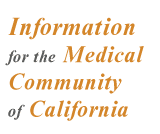|

This CPPPH newsletter aims to keep readers abreast of current developments and relevant information about physician health and wellbeing in California.
All past issues are available from the CPPPH website: www.CPPPH.org.
Definitions
Wellness activities address quality of life and professional satisfaction for all physicians.
Wellbeing activities focus on an individual physician and provide resources for identifying, evaluating, referring, treating, and monitoring for physicians when addiction, mental health, behavioral issues, and the effects of aging are a concern.
Confidential Assistance Over the Phone
The Physicans’ and Dentists’ Confidential Assistance Line is a 24-hour phone service providing completely confidential doctor-to-doctor assistance for physicians experiencing substance use or mental health issues. Call:
Send Us Your Comments
We want to hear from you. Send comments to gjara@cppph.org.
|

Physician Health Program for California Tabled — Testimony Says Early Intervention Should Be the Key
The next step toward getting a physician health program for California will come at the May 23-24 meeting of the Medical Board of California when the Board is expected to invite subject matter experts to help them reach agreement on whether to accept the proposed regulations or seek changes in the legislation that governs the Board’s new Physician Health and Wellness Program.
For their meeting on Feb. 29-Mar 1, the Medical Board distributed copies of the proposed regulations and all the comments received during the 45-day comment period that ended November 14. (Read the full text of proposed regulations and all the comments received HERE).
As the February meeting began, the Board heard comments from the California Medical Association, the Federation of State Physician Health Programs and the California Society of Addiction Medicine. All advocated for a program that would protect the public by providing an avenue of early intervention and said that the proposed program would not do that.
The President Elect of the CMA, Shannon Udovic-Constant, MD, reminded the Medical Board that it was CMA that sponsored the authorizing legislation SB1177 in 2016. She said, “CMA’s goal was to empower the board to address problems upstream by providing support and rehabilitation for physicians dealing with substance abuse, mental health challenges and burnout. That bill was narrowed down to target substance abuse. Now, eight years and one global pandemic later, I am here on behalf of CMA’s nearly 50,000 physician members to ask the board to reevaluate national best practices in physician health and wellness to work towards our common goal of better serving the public. … To that end, we are requesting the board invite subject matter experts such as the Federation of State Physician Health Programs or the Dr. Lorna Breen Heroes Foundation to share their best practices for physician health programs and how the Medical Board of California can achieve them.”
The Executive Director of the Federation of State Physician Health Programs, Linda Bresnahan, MS, said, “It is imperative to recognize that a confidential authorized physician health program is indispensable in every state. These programs offer a safe and supportive pathway for early referral and intervention for mental health and substance use disorders among physicians and healthcare professionals. By separating from disciplinary processes, these programs ensure timely assistance without fear of punitive measures, nurturing a culture of wellness, accountability, and patient safety. Early referral to PHPs can avert adverse professional consequences and safeguard patients, benefiting both participants and the medical community as a whole. FSPHP stands ready to provide additional information should the California Board decide to explore this topic further.”
Randolph Holmes, MD, spoke for the California Society of Addiction Medicine: “Medical doctors in California have gone too long without a physician health program. Physician health programs that align with best practices in other states have a track record of patient protection by ensuring that physicians receive care early. As physicians, we know how to improve outcomes by identifying issues early, not letting patients wait until a disease has progressed. Addiction medicine is no different. We hope the Board will revisit what we know about best practices to ensure that we’re doing the most to protect patients by having a healthy physician workforce.
Drug Testing: When, Why and How – CPPPH Guideline
The guideline titled, “Medical Staff Policies and Procedures for Drug Testing: What You Test For, When, Why and How” is available from the CPPPH website for the first time, with a brief “look inside” and a fee for downloading the full document. Click HERE.
Also available on that page are the other CPPPH guidelines:
- Behaviors that Undermine a Culture of Safety: Policies and Procedures for Medical Staffs and Medical Groups (CPPPH March 2017)
- Assessing Late Career Practitioners: Policies and Procedures for Age-based Screening (CPPPH April 2015)
- Guidelines for Evaluations of Health Care Professionals CPPPH October 2013)
- Guidelines for Selecting Physician Health Services (CPPPH September 2013)
CPPPH Programs in 2024
After our 2023 programs, we asked you what your priorities were for the topics CPPPH should cover in the educational sessions we provide. What we learned became the basis for a new approach to content for 2024.
Some of CPPPH’s programs will now be designed for persons fairly new to wellbeing committees and physician health matters. Other programs will be designed for those who have been involved for longer periods of time and whose experience has been more wide-ranging or comprehensive.
For example, beginning on April 18, there will be a series of five videoconferences that, taken together, provide an orientation, or a refresher titled “Best Practices for Wellbeing Committees.” To register for that series, click HERE.
Then, at scheduled times during the rest of the year, there will be 90-minute videoconferences on the more specific topics. If you have suggestions for a specific topic we should cover, send an email to gjara@cppph.org.
|